北师大版(三起)五下《Unit 9 Day and night》教案
五年级下册英语教案 Unit9 Day and night Lesson1 北师大版(三起)
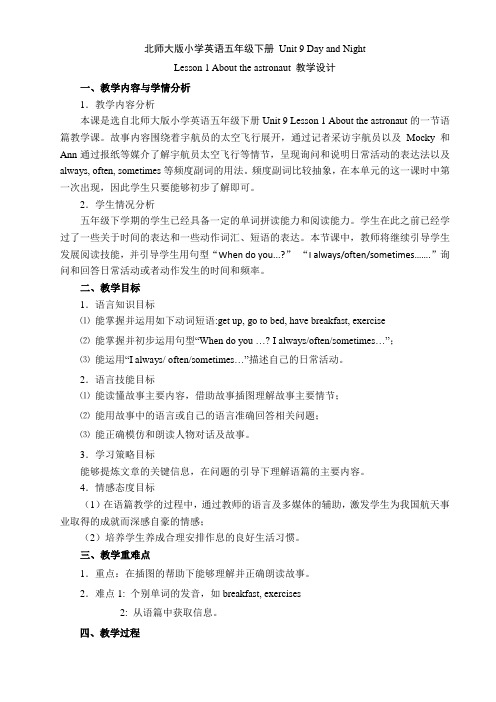
北师大版小学英语五年级下册Unit 9 Day and NightLesson 1 About the astronaut 教学设计一、教学内容与学情分析1.教学内容分析本课是选自北师大版小学英语五年级下册Unit 9 Lesson 1 About the astronaut的一节语篇教学课。
故事内容围绕着宇航员的太空飞行展开,通过记者采访宇航员以及Mocky 和Ann通过报纸等媒介了解宇航员太空飞行等情节,呈现询问和说明日常活动的表达法以及always, often, sometimes等频度副词的用法。
频度副词比较抽象,在本单元的这一课时中第一次出现,因此学生只要能够初步了解即可。
2.学生情况分析五年级下学期的学生已经具备一定的单词拼读能力和阅读能力。
学生在此之前已经学过了一些关于时间的表达和一些动作词汇、短语的表达。
本节课中,教师将继续引导学生发展阅读技能,并引导学生用句型“When do you...?”“I always/often/sometimes…….”询问和回答日常活动或者动作发生的时间和频率。
二、教学目标1.语言知识目标⑴能掌握并运用如下动词短语:get up, go to bed, have breakfast, exercise⑵能掌握并初步运用句型“Whe n do you …? I always/often/sometimes…”;⑶能运用“I always/ often/sometimes…”描述自己的日常活动。
2.语言技能目标⑴能读懂故事主要内容,借助故事插图理解故事主要情节;⑵能用故事中的语言或自己的语言准确回答相关问题;⑶能正确模仿和朗读人物对话及故事。
3.学习策略目标能够提炼文章的关键信息,在问题的引导下理解语篇的主要内容。
4.情感态度目标(1)在语篇教学的过程中,通过教师的语言及多媒体的辅助,激发学生为我国航天事业取得的成就而深感自豪的情感;(2)培养学生养成合理安排作息的良好生活习惯。
北师大版(三起)五下《Unit 9 Day and night》word教案1
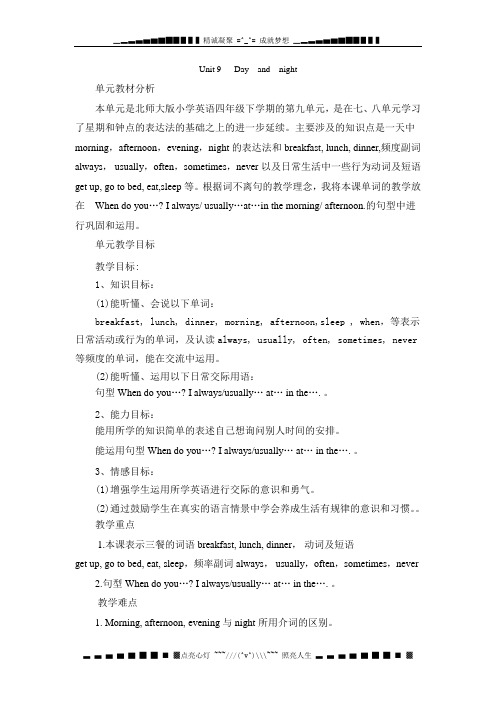
Unit 9 Day and night单元教材分析本单元是北师大版小学英语四年级下学期的第九单元,是在七、八单元学习了星期和钟点的表达法的基础之上的进一步延续。
主要涉及的知识点是一天中morning,afternoon,evening,night的表达法和breakfast, lunch, dinner,频度副词always, usually,often,sometimes,never以及日常生活中一些行为动词及短语get up, go to bed, eat,sleep等。
根据词不离句的教学理念,我将本课单词的教学放在When do you…? I always/ usually…at…in the morning/ afternoon.的句型中进行巩固和运用。
单元教学目标教学目标:1、知识目标:(1)能听懂、会说以下单词:breakfast, lunch, dinner, morning, afternoon,sleep , when,等表示日常活动或行为的单词,及认读always, usually, often, sometimes, never 等频度的单词,能在交流中运用。
(2)能听懂、运用以下日常交际用语:句型When do you…? I always/usually… at… in the…. 。
2、能力目标:能用所学的知识简单的表述自己想询问别人时间的安排。
能运用句型When do you…? I always/usually… at… in the…. 。
3、情感目标:(1)增强学生运用所学英语进行交际的意识和勇气。
(2)通过鼓励学生在真实的语言情景中学会养成生活有规律的意识和习惯。
教学重点1.本课表示三餐的词语breakfast, lunch, dinner,动词及短语get up, go to bed, eat, sleep,频率副词always, usually,often,sometimes,never2.句型When do you…? I always/usually… at… in the…. 。
北师大版-英语-五年级下册-Unit 9 Day and Night第二课 同步教案
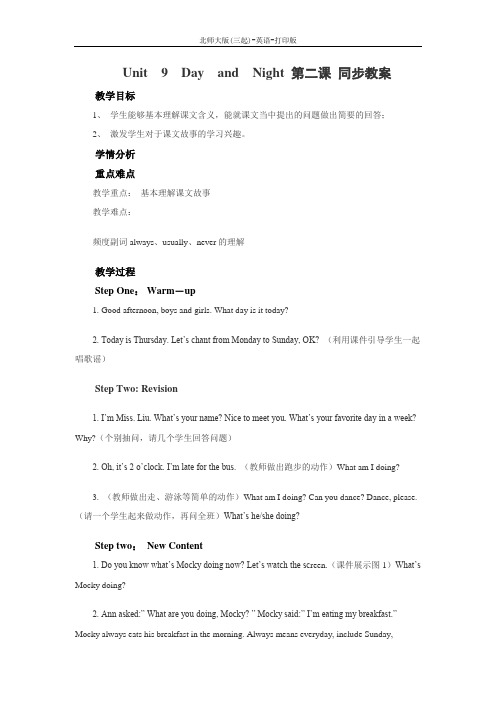
Unit9Day and Night 第二课同步教案教学目标1、学生能够基本理解课文含义,能就课文当中提出的问题做出简要的回答;2、激发学生对于课文故事的学习兴趣。
学情分析重点难点教学重点:基本理解课文故事教学难点:频度副词always、usually、never的理解教学过程Step One: Warm-up1. Good afternoon, boys and girls. What day is it today?2. Today is Thursday. Let’s chant from Monday to Sunday, OK? (利用课件引导学生一起唱歌谣)Step Two: Revision1. I’m Miss. Liu. What’s your name? Nice to meet you. What’s your favorite day in a week? Why?(个别抽问,请几个学生回答问题)2. Oh, it’s 2 o’clock. I’m late for the bus. (教师做出跑步的动作)What am I doing?3. (教师做出走、游泳等简单的动作)What am I doing? Can you dance? Dance, please. (请一个学生起来做动作,再问全班)What’s he/she doing?Step two:New Content1. Do you know what’s Mocky doing now? Let’s watch the sc reen.(课件展示图1)What’s Mocky doing?2. Ann asked:” What are you doing, Mocky? ” Mocky said:” I’m eating my breakfast.” Mocky always eats his breakfast in the morning. Always means everyday, include Sunday,Monday, Tuesday, Wednesday, Thursday, Friday, Saturday and all the holidays. Read after me, always, use your fingers, a-l-w-a-y-s, always. Read after me, I always eat breakfast in the morning.3. (课件展示图2)Now, Mocky wants to know what time does Ann eat her breakfast. So he asked:” When do you eat breakfast, Ann?” Ann answered:”breakfast in the morning, too.” When equals to what time. (板书提示)4. When do you eat breakfast? OK, please ask your partner when does he or she eat breakfast? Practice in pairs. (引导学生两人小组进行对话练习)Who want to have a try? Hands up. (请几个学生回答问题)5. Do you always eat breakfast in the morning? On Saturdays, I don’t eat breakfast in the morning. I sleep in the morning on holidays. So I could only say: I usually eat breakfast in the morning. Usually means not always.6. (课件展示图6)Ann and Mocky go to visit Uncle Booky. Ann wanted to know what does Uncle Booky do in the morning. Do you want to know? How does Mocky answer her? Watch the screen. Let’s read the sentence together. He usually reads a book. What do you do in the morning?(询问几个学生)Now you can ask your partner what does he or she do in the morning or afternoon, practice in pairs.(引导学生进行两人练习,并请两组学生起来展示对话)7. Ken, Ann and Mocky go to visit Uncle Booky. Now, they are at Uncle Booky’s house. But where is Uncle Booky?8. (课件展示图9)Do they find Uncle Booky? Where is he? Does Mocky know? No, he doesn’t know. He says:” I don’t know. He’s usually at home in the morning.”9. (课件展示图10)Uncle Booky is usually at home in the morning, when does he go to the store? Ken wants to know, so he asks. Mocky answered:” He o ften goes to the store in the afternoon. He never goes in the morning.” Often and usually are almost the same meaning.(手势讲解差不多相同)Never means no, not.(加上表情、手势强调never,贴片讲解)Let’s read the two sentences together. He often goes to the store in the afternoon. He never goes in the morning.10. Where is Uncle Booky? What’s he doing now? Can you guess?(请两三个学生起来猜Uncle Booky到底在做什么)Look, he’s sleeping. He sometimes sleeps in the morning! Uncle Booky usually reads a book in the morning, but that day, he sleeps. So he sometimes sleeps in the morning.Step three: Practice1. Do you like the story? I like it because it’s funny. Let’s watch it from the very beginning. After you watch the whole story, please answer my questions.(课件从头播放故事动画)2. Here are the questions for you.(课件展示提问的几个问题)You can talk with your partner, and then give me your answer.(引导学生小组之内根据课文内容讨论问题,然后进行问题的回答)3. After class, please read the story after the tape. Next time, please tell the story to us, OK? That’s all for today. Goodbye, boys and girls!。
小学五下北师大英语Unit 9 Day and nightLesson 2 学案
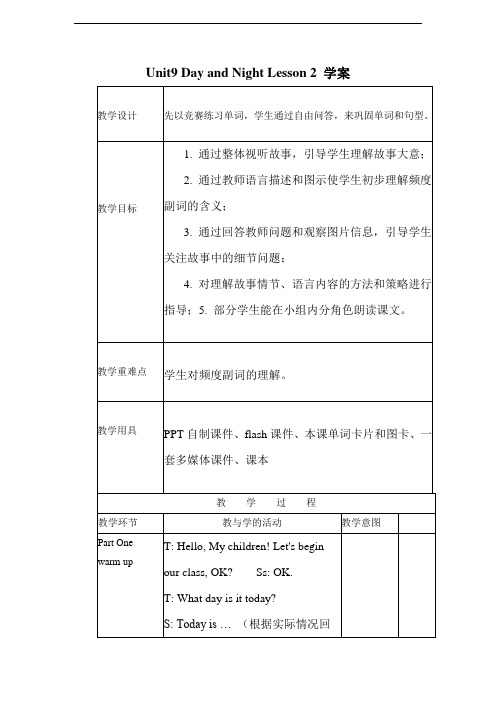
出现错误,教师可适当予以纠正。)
操练若干组后继续…… 设计
意图:复习前两个单元主要句型的
同时,自然导入新课。
Part
TwoStep 2 复习故事内容
presentation
1. 回顾 lesson1 故事内容。
T: Today is Sunday. So they
have time to play with Mocky. What
(注:学生对于 morning, afternoon,
evening 这三个词并不陌生,教师稍
加提醒即可唤起学生记忆。)
T: 教师指着刚刚回答问题的学生
问 What does he/she usually do on
Sunday?
Ss: He/ She goes to the … (学生说动
词第三人称单数的变化时有可能会
do they want to do next? Let's watch the story. 教师播放课文光盘一 遍,学生视听。
T: What do they want to do next?
Ss: Visit Uncle Booky. T: Good. 2. 关注并谈论图 1—3 的细节信 息。
breakfast. (边说边用 PPT 展示
极性
Mocky 正在吃早饭的图片,用图片
和语言解释 breakfast 的意思)
(Breakfast means the things you eat
in the morning. Such as eggs, porridge and something like these(2) 通过回答问题,理解图 1-3 的主要 事件信息。 T: OK, this time please open your books and read pictures 1,2 and 3 carefully .Then answer the following questions. (教师用 PPT 展示所提 出的问题) ①Does Mocky always eat breakfast in the morning? ②Does Mocky always eat breakfast so late? ③When (=What time) does Ann eat breakfast? 注:在呈现问题的过程中,教师解 释、教授 always, late 等词。如: Mocky eats breakfast in the morning on Monday,Tuesday, Wednesday, Thursday, Friday, Saturday and Sunday. So we can say Mocky always eats breakfast in the morning.
五年级下英语教案Unit9Dayandnight_北师大版(三起)

Unit 9 Day and night(第一课时)教学目标:(1)通过学习,能够用英语简单描述自己一天的活动。
(2)对学生进行养成安排良好作息时间的教育。
(3)培养学生的综合素质及英语能力。
教学重点:1.掌握下列这些句型:When do you always/usually/often/sometimes/never/ eat breakfast?I __________ eat breakfast__________.2.When does he always/usually/often/sometimes/ do in the morning?He_______ goes to the store___________.教学难点: 能在相关的语境中正确运用所学句型。
教具准备: 教学卡片、多煤体等。
教学过程:一、导入师:What time do you go to school ?生:I go to school_____________.二、学习生词always、 usually、 often、 sometimes、 never。
1).学习生词 always师:What time do you get up ?生:I get up at ______________.师:Yes, I always get up at six .师再问:When do you get up ? (When means what time)师出示when生词卡片,学习生词when。
师再问另外几个同学此句型,师还用 I always ______________.句型回答。
师出示always 生词卡片,学习生词always。
2). 用同样方法的学习 usually、 often。
3). 学习生词 sometimes 师: When do you go to bed every day ?生: I go to bed at __________.师: Oh , you go to bed too late. So you sometimes go to school late . 师出示sometimes生词卡片,学习生词sometimes.4). 学习生词 never.师: When do you go to bed every day ?生: I go to bed at __________.5)师: Oh , you go to bed too early. So you never go to school late .师出示never 生词卡片,学习生词never.5). 跟录音认读生词always、 usually、 often、 sometimes、 never。
4.2五英Unit9复习 教案
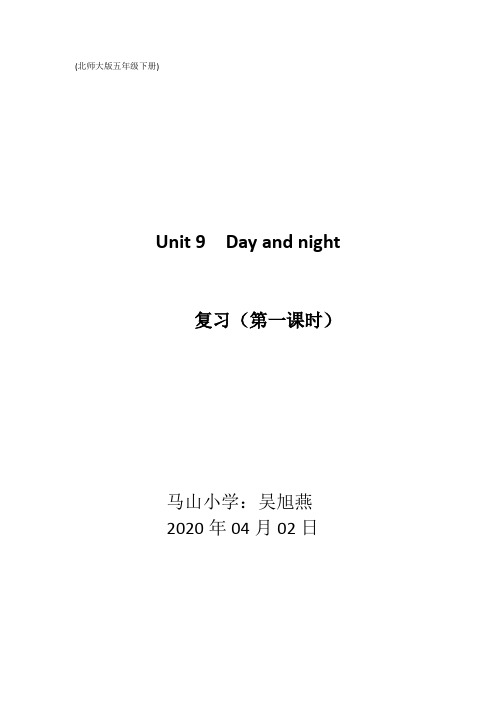
(北师大版五年级下册)Unit 9 Day and night复习(第一课时)马山小学:吴旭燕2020年04月02日Unit 9 Day and night复习(第一课时)Teaching Aims:(一)教学目标:1、会读、能默写Unit9前十个单词2、掌握小黑板句型3、会唱P38 Chant(二)能力目标:1、培养学生听说读写唱能力。
2、能熟练运用句子到生活当中。
(三) 情感目标:1、激发学生学习英语的兴趣,培养学习英语的积极态度,使学生乐于学习、主动、大胆、积极地参与,并勇于进行交际实践。
2、明白抗击疫情,人人有责。
并向奋战在抗疫一线的全体工作人员致敬!Teaching Important Points1、会读、能默写Unit9前十个单词2、掌握小黑板句型3、会唱P10 ChantTeaching Difficult Points掌握小黑板句型Teaching Aid幻灯片Teaching ProcessStep One: Warming up(Sing a Song)Step Two: Reviews the Words对十个单词的读音进行讲解,特别是每一个单词相关的短语。
Step Three: Spell the Words拼读单词。
Step Four: Sing the Sentences复习When do you get up? ...When does he/she get up?...教学生l 练习句型。
Step Five:Let’s Chant再次学习歌词,跟唱。
告诉学生不管是学习还是玩耍,都要待在家里。
Step Six: Homework1. 默写Unit9单词表前十个单词2. 说句型:When do you get up?...When does he get up?...3. 会唱第38页歌谣Blackboard design:Unit 9 Day and nightWhen do you get up?I /We always get up at seven o’clock in the morning. When does he/she go to school?He/She always goes to school at eight o’clock.。
小学五下北师大英语Unit 9 Day and night Lesson 3 Have Fun 教案
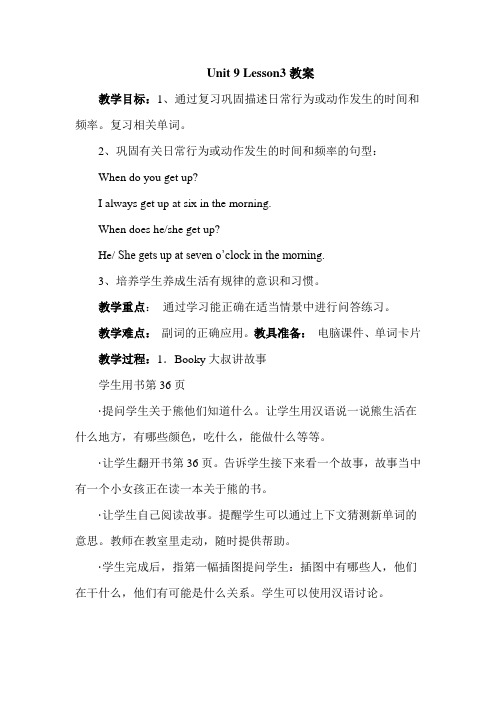
Unit 9 Lesson3教案教学目标:1、通过复习巩固描述日常行为或动作发生的时间和频率。
复习相关单词。
2、巩固有关日常行为或动作发生的时间和频率的句型:When do you get up?I always get up at six in the morning.When does he/she get up?He/ She gets up at seven o’clock in the mornin g.3、培养学生养成生活有规律的意识和习惯。
教学重点:通过学习能正确在适当情景中进行问答练习。
教学难点:副词的正确应用。
教具准备:电脑课件、单词卡片教学过程:1.Booky大叔讲故事学生用书第36页·提问学生关于熊他们知道什么。
让学生用汉语说一说熊生活在什么地方,有哪些颜色,吃什么,能做什么等等。
·让学生翻开书第36页。
告诉学生接下来看一个故事,故事当中有一个小女孩正在读一本关于熊的书。
·让学生自己阅读故事。
提醒学生可以通过上下文猜测新单词的意思。
教师在教室里走动,随时提供帮助。
·学生完成后,指第一幅插图提问学生:插图中有哪些人,他们在干什么,他们有可能是什么关系。
学生可以使用汉语讨论。
·指人物对话框中的句子,放录音。
用同样的方法完成其他插图。
注意使学生都能够理解每句话的大意。
·再放一遍录音,每次播放一幅插图的内容。
让学生跟随录音重复。
·指人物对话框中的句子,放录音。
用同样的方法完成其他插图。
注意使学生都能够理解每句话的大意。
再放一遍录音,每次播放一幅插图的内容。
让学生跟随录音重复。
2.钟表的游戏这个游戏可以用来复习时间的表达法。
·在黑板上画两个表盘,用1至12标出整点的位置。
教师说:“One o'clock.”让学生说出钟表的指针应该指哪些数字。
学生应该说时针指分针指120在表盘上标出指针。
·用同样的方法完成one fifteen,one thirty和one forty-five。
小学英语教案 北师大版五年级下册英语Unit9 Day and night 教案
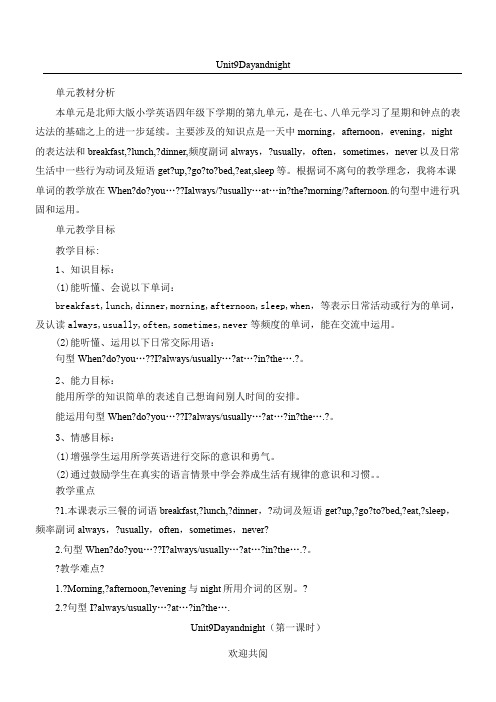
Unit9Dayandnight单元教材分析本单元是北师大版小学英语四年级下学期的第九单元,是在七、八单元学习了星期和钟点的表达法的基础之上的进一步延续。
主要涉及的知识点是一天中morning,afternoon,evening,night 的表达法和breakfast,?lunch,?dinner,频度副词always,?usually,often,sometimes,never以及日常生活中一些行为动词及短语get?up,?go?to?bed,?eat,sleep等。
根据词不离句的教学理念,我将本课频率副词always,?usually,often,sometimes,never?2.句型When?do?you…??I?always/usually…?at…?in?the….?。
?教学难点?1.?Morning,?afternoon,?evening与night所用介词的区别。
?2.?句型I?always/usually…?at…?in?the….Unit9Dayandnight(第一课时)知识目标:1、学习新单词:breakfast,lunch,dinner,morning,afternoon,sleep,when,等表示日常活动或行为的单词,及认读always,usually,often,sometimes,never等频度的单词,能在交流中运用。
2、学习句型:Whendoyou(getup)?I(always)getupat(seveno’clock).能够在交流加以运用。
3、学习故事,初步感知句型,理解内容。
能力目标:1、能初步认读运用单词及句型2、能够理解故事内容,并朗读课文故事情感目标:教学重点:能够运用句型:Whendoyou(…)?(...o’clock).来描述自己做某事的时间和频率。
12,等表示日常活动或等频度的单词,能在交流中运用。
2)getupat(seveno’clock).能够在交流加以运用。
北师大版-英语-五年级下册-Unit 9 Day and Night Lesson2名师教案
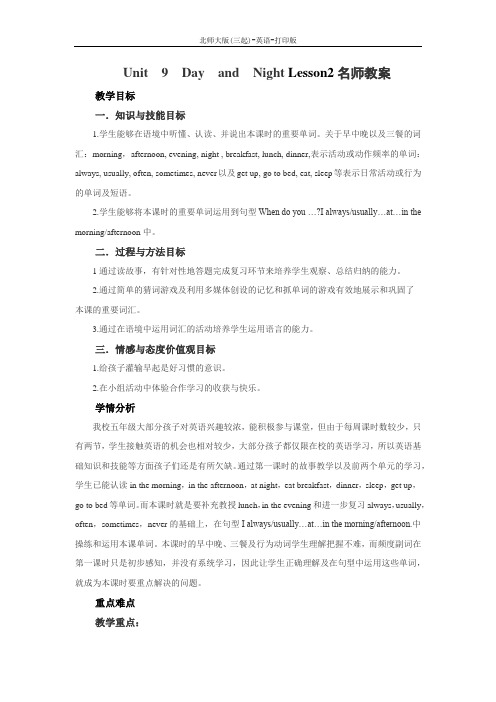
Unit9Day and Night Lesson2名师教案教学目标一.知识与技能目标1.学生能够在语境中听懂、认读、并说出本课时的重要单词。
关于早中晚以及三餐的词汇:morning,afternoon, evening, night , breakfast, lunch, dinner,表示活动或动作频率的单词:always, usually, often, sometimes, never以及get up, go to bed, eat, sleep等表示日常活动或行为的单词及短语。
2.学生能够将本课时的重要单词运用到句型When do you …?I always/usually…at…in the morning/afternoon中。
二.过程与方法目标1通过读故事,有针对性地答题完成复习环节来培养学生观察、总结归纳的能力。
2.通过简单的猜词游戏及利用多媒体创设的记忆和抓单词的游戏有效地展示和巩固了本课的重要词汇。
3.通过在语境中运用词汇的活动培养学生运用语言的能力。
三.情感与态度价值观目标1.给孩子灌输早起是好习惯的意识。
2.在小组活动中体验合作学习的收获与快乐。
学情分析我校五年级大部分孩子对英语兴趣较浓,能积极参与课堂,但由于每周课时数较少,只有两节,学生接触英语的机会也相对较少,大部分孩子都仅限在校的英语学习,所以英语基础知识和技能等方面孩子们还是有所欠缺。
通过第一课时的故事教学以及前两个单元的学习,学生已能认读in the morning,in the afternoon,at night,eat breakfast,dinner,sleep,get up,go to bed等单词。
而本课时就是要补充教授lunch,in the evening和进一步复习always,usually,often,sometimes,never的基础上,在句型I always/usually…at…in the morning/afternoon.中操练和运用本课单词。
五年级下册英语教案-Unit9 Day and night Lesson4|北师大版
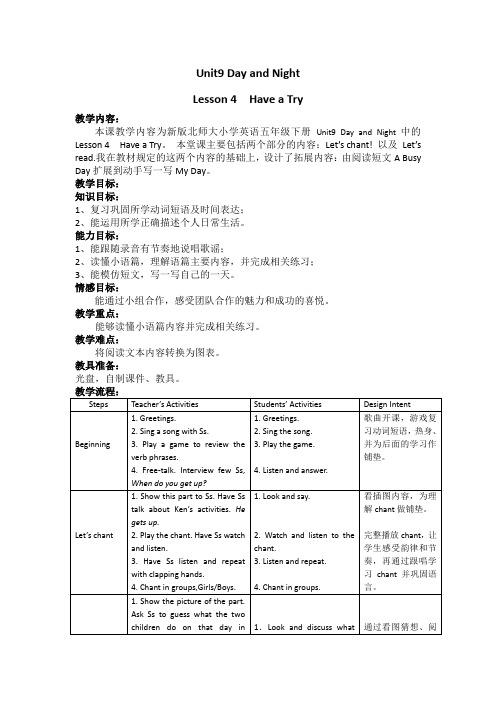
Unit9 Day and Night
Lesson 4 Have a Try
教学内容:
本课教学内容为新版北师大小学英语五年级下册Unit9 Day and Night中的Lesson 4 Have a Try。
本堂课主要包括两个部分的内容:Let’s chant! 以及Let’s read.我在教材规定的这两个内容的基础上,设计了拓展内容:由阅读短文A Busy Day扩展到动手写一写My Day。
教学目标:
知识目标:
1、复习巩固所学动词短语及时间表达;
2、能运用所学正确描述个人日常生活。
能力目标:
1、能跟随录音有节奏地说唱歌谣;
2、读懂小语篇,理解语篇主要内容,并完成相关练习;
3、能模仿短文,写一写自己的一天。
情感目标:
能通过小组合作,感受团队合作的魅力和成功的喜悦。
教学重点:
能够读懂小语篇内容并完成相关练习。
教学难点:
将阅读文本内容转换为图表。
教具准备:
光盘,自制课件、教具。
板书设计:
Unit9 Lesson4 Have a Try
When do you ___________ ?
I ______________________.
When does he/she_______?
He/ She ________________.。
小学五下北师大英语Unit 9 Day and night Lesson 6 Round Up 教案
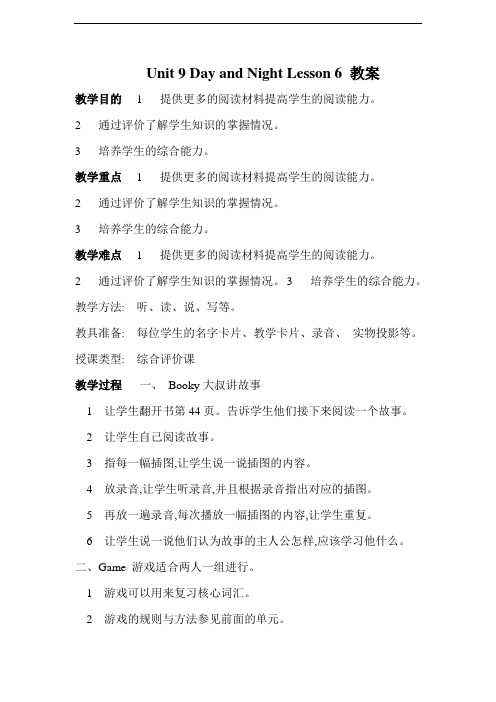
Unit 9 Day and Night Lesson 6 教案教学目的1提供更多的阅读材料提高学生的阅读能力。
2通过评价了解学生知识的掌握情况。
3培养学生的综合能力。
教学重点1提供更多的阅读材料提高学生的阅读能力。
2通过评价了解学生知识的掌握情况。
3培养学生的综合能力。
教学难点1提供更多的阅读材料提高学生的阅读能力。
2通过评价了解学生知识的掌握情况。
3培养学生的综合能力。
教学方法:听、读、说、写等。
教具准备:每位学生的名字卡片、教学卡片、录音、实物投影等。
授课类型:综合评价课教学过程一、Booky大叔讲故事1让学生翻开书第44页。
告诉学生他们接下来阅读一个故事。
2让学生自己阅读故事。
3指每一幅插图,让学生说一说插图的内容。
4放录音,让学生听录音,并且根据录音指出对应的插图。
5再放一遍录音,每次播放一幅插图的内容,让学生重复。
6让学生说一说他们认为故事的主人公怎样,应该学习他什么。
二、Game 游戏适合两人一组进行。
1游戏可以用来复习核心词汇。
2游戏的规则与方法参见前面的单元。
三、自我评价1告诉学生在一天中他们的活动事件及时间。
2让学生看第二个活动所列的问题。
告诉他们在这个活动中需要他们回答这些问题。
读第一个问题,引导学生回答。
然后让学生把各自的答案写在后面的横线上。
用同样的方法完成其余的问题。
活动的最后, 叫单个学生说一说他们是怎样回答的。
五、自我反思自我反思部分让学生回顾自己的学习,并展望将来的学习。
1让学生看本页下部的自我反思卡。
让学生独自或两人一组,根据所列条目逐一进行自我评价。
所有的学生完成之后让他们相互交流评价的结果。
2告诉学生在课本里找出以这个单词中每个字母开头的单词。
3让学生两人一组来完成练习,把找到的单词写出来。
4教师检查学生的拼写。
可以增加这个游戏的竞争性。
告诉学生,最先完成的两名学生获胜, 并强调每个单词的拼写必须正确。
课后反思。
- 1、下载文档前请自行甄别文档内容的完整性,平台不提供额外的编辑、内容补充、找答案等附加服务。
- 2、"仅部分预览"的文档,不可在线预览部分如存在完整性等问题,可反馈申请退款(可完整预览的文档不适用该条件!)。
- 3、如文档侵犯您的权益,请联系客服反馈,我们会尽快为您处理(人工客服工作时间:9:00-18:30)。
1. five adverb frequent words
2.New patterns:
When do you ________?
I always ________.
When does he/she_____?
He/she usually_______.
3. difficult points
get up go to bed
in the morning.
at night He She
afternoon. Never
sometimes get up
goes to bed at
7 8 12 9 10
o’clock eats lunch
Step 4 Consolidation
T: Open your books to page 33. You can find out lots of sentences in it .
集备后修改、补充
Step I Warm-up and revision
Play a chant
Listen and do the actions
(reading drinking eating running sleeping jumping cooking washing painting)
Step 2 presentation and drills
sounds and letters
本单元教学重难点
1.key points
What do you go to school every day?
When do you go to school?
2. Difficult points
When does he/she get up ?
He/ She usually______
Step 2 presentation and drills
T: Today we’ll learn the new words in Unit 9.
First open the books to page 28 preview them by yourself.
Now let’s watch the video and learn the words one by one.
I sleep at night.
She is sleeping.
He sometimes sleeps in the morning.
Text
1.More verbs and verbal phrases are involved. (Attention to the third person singular form.)
6. Play the courseware
Show the adverb frequent words
Always usually often sometimes never
Step 3 practice
1. Play the courseware and let them make the sentences
When does he get up? He often gets up at seven.
作业
设计
1. Read the text 5 times.
2. Copy the new words.
3. Preview next lesson.
选做:小组表演课文或者背诵课文
课
后
反
思
The students can’t grasp the adverb frequent words .
2. Comparisons on Simple Present and Present Continuous.
3. Key Structure:
Adverbs of frequency;
When do you …?
When does she/he …?
4. “There’s Lulu.”
“There’s Bobby.” (Book 7 Unit 2)
4. Without the tape ,point to one of the pictures or words and let students read it out
5. Play games
Bomb game
Which word is missing?
6. Encourage them to find out good ways to remember the new words
4. Show the courseware
5. T: How often do they do the things ?
Discuss the questions and find out the correct words to fill in the blanks to complete the sentences. All the sentences are in the story.
课题
Unit 9 Day and night
课型
新授
时数
9
教学
目标
(重点
☆
难点
△)
一、知识目标与能力目标
☆学生能够认读、听辨、默写Words to learn中的个单词;
☆能够认读、听辨单词表中相关词汇;
☆学生能够听辨、认读并使用功能句型
☆能够认读、听辨字母组合的发音;
△能够整体感知text,能力水平较高的学生能够表演;
本单元的主题(单元名称)
Unit 9 Day and Night
学情
分析
The students have learned how to express people’s activities in English . This unit they will learn how to express how often they do activities.
1. Play the video and let them think about the following questions.
What is Mocky doing at the beginning of the story?
What is Uncle Booky doing at the end of the story?
2. T: Now I play the tape and you touch the matching words or pictures.
3. T: This time I play the tape again, and I can stop the tape after each phrase or word and you repeat it.
For example:
Sea eat sheep sleep
Step 3 Practice
1. Play the courseware and let them make the sentences
When do youget up ? go to bed?
I We always
usually often
What is Lulu doing?
2. Mow let them answer the questions
3. T: Can you find out What activity that Mocky,Ann and Uncle Booky do in the story?
Read the story carefully and underline them on the book.
2. play the tape and let them repeat it
3. ask and answer
T: When do you get up?
Ss:
T: Do you always get up in the morning?
Ss:
T: What about your mother?
When does she get up?
教学过程第(2)课时Words to learn,Uncle Booky’s Blackboard
教学过程
集备后修改、补充
Step I Warm-up and revision
Play a chant
Listen and do the actions
(reading drinking eating running sleeping jumping cooking washing painting getting up )
科研课题落实
严格“六规范”,提高课堂质量。随着学习内容的扩展,教师需要通过认真备课,认真设计,有意识、有计划地培养学生的合作精神和创新意识,引导学生通过以旧带新的方式自主学习,同时也要注重合作学习。
板
书
设
计
Unit 9 Day and night
When do you get up. I always get up at seven.
T: You do very well. You do the actions during the diary routine. Do you want to know other people’s diary routine. Now let’s watch the video and find out Uncle Booky”s diary routine.
Step 5 sum-up
Pay attention to the third sing single forms about the verbs
